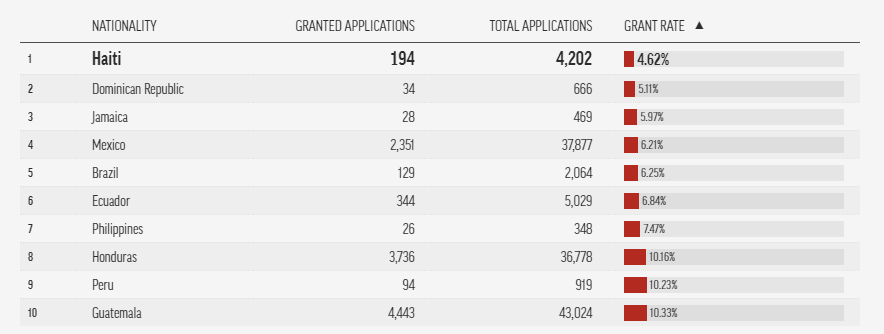America’s Haitian migrant border crisis a replay of racism, cruelty and horror

Photo/CGTN
Riding astride his high horse with a thick whip clutched in hand, a uniformed agent roars furiously and lashes at his target—a human, unarmed and barefooted, who can barely keep his balance while clinging onto a plastic bag holding his meal. This is not a scene from HBO’s TV drama Westworld, but a real-world event unfolding along the US border near Texas (thankfully, there are cameras!). With some 15,000 Haitian migrants flocking towards the Del Rio International Bridge in Texas recently, similar horrors have been replaying and multiplying over and over again.
While American President Joe Biden called the border crisis “an embarrassment” and Vice President Kamala Harris said it reminded her of “times of slavery,” many only saw a continuation: a wound cut too deep to cure whoever the surgeon might be. Hardly had the preceding turmoil in Donna and El Paso, Texas, started to ease when the latest crisis began to loom on the horizon. They just keep coming and coming.
The U.S. Border Patrol has a thousand ways to “rein back” Haitian migrants and asylum-seekers, and yet they have resorted to the most barbaric course of action, one that is so “inhumane” that it has prompted the resignation of Daniel Foote, a senior diplomat and US special envoy for Haiti.
The chaos at America’s doorstep is a by-product of the deep-seated racism that is in the genes of America as a nation. The long whip swung into the air to corral Haitian asylum-seekers is a gavel that sentences them to their fate of not belonging, with their skin color having denied their entrance into the U.S. long before even setting feet near the U.S.-Mexico border.

Screenshot
Only 4.62% of Haitians were allowed to seek asylum in the U.S. during the period from October 2018 to June 2021, the lowest rate among 83 nationalities based on available data, according to The Associated Press. The chart above shows the grant rates for asylum-seekers based on their nationalities, from bottom to top, and is almost identical to the spectrum of skin colors, in which the lighter one’s skin is, the more likely he or she will be granted asylum in the U.S.
“Now through the videos capturing the abuses on Haitians at the border, the world has now seen for itself that all migrants seeking a better tomorrow aren’t treated equal when skin color is involved,” said Yoliswa Cele, founder of the UndocuBlack Network, a national advocacy organization for undocumented Black people.
Carl Lindskoog, author of Detain and Punish: Haitian Refugees and the Rise of the World’s Largest Immigration Detention System, also believed that it is the skin color of Haitian asylum-seekers that has rendered them unwelcome. “What’s happening at the border is horrifying and fits into the long intersecting history of anti-Black, anti-immigrant sentiment and anti-Haitian exclusion,” he said, during an interview with Vox.
Citing America’s records of passing racist policies to “deter Haitians from coming in,” Mr. Linskoog highlighted America’s long history of anti-Haitian sentiment. “They (Haitians) have, for most of history, been met with exclusion,” he added.
The past several years have witnessed a rollercoaster of emotions shared by many migrants and asylum-seekers (including people of color like Haitians in particular) who have sought a way to get into America. But that rollercoaster seems to have followed the pattern of a Möbius strip—round and round, the racist sentiments persist, policy hurdles remain, and the dream-chasers stay “where they belong”.
The Trump administration, which didn’t even bother to mask its racist and xenophobic attitudes, invoked Title 42 to allow deportation based on health concerns, regardless of the fact that the U.S. at that time was the most COVID-19-friendly place on the planet. In fact, his presidency was built on exclusion, isolationism, and xenophobia, in which bizarre policies such as the Muslim ban and a border wall were adopted to show most migrants the door, while catering to voters who had seen migrants as threats to their jobs and security.
With Biden in the White House, many had prophesied hope and change but both turned out to be nada. The Biden administration has invoked the same Title 42 to expel Haitian asylum-seekers back to Haiti, a nation freshly shattered by a magnitude 7.2 earthquake and political turmoil. “We’re being stabbed in the back, Mr. President (Biden),” so said Al Sharpton, an American civil rights activist, in response to Biden’s mishandling of the Haitian migrant border crisis.
The fate that lies ahead for each Haitian asylum-seeker at the border is certain—they all will be expelled and forced into the uncertain future. But it is just a matter of time before the next wave of victims arrive, the next wave of crisis erupts, and the next wave of cruelty plays out.

Photo taken on Sept. 19, 2021 from Ciudad Acuna, Mexico shows Migrants attempting to cross the river Rio Bravo on the border between Mexico and the United States. (Str/Xinhua)
The U.S. is fond of preaching about human rights, having become so complacent on its moral high horse that it has lost the ability to reflect upon itself and the courage needed to redress its own wrongdoings. It is preoccupied with framing other nations on the basis of falsified documents and reports, and yet it has failed to hold anyone accountable for the ferocious slaughter of ten civilians, including an aid worker and seven children, in a ruthless drone strike in Afghanistan’s capital; it is obsessed with concocting myths and conspiracy theories surrounding the origins of COVID-19, and yet it has failed to protect the right to life for its most vulnerable groups, especially the elderly in nursing homes and children at schools; it has continued to exert sanctions against nations around the globe, and yet it has failed to ameliorate the ongoing human rights crisis at its own border.
“With a memory like a goldfish, America circles its bowl, returning to where we have been, unable to move forward, condemned to repeat a past we should escape.” So wrote Maureen Dowd, an opinion columnist with the New York Times, in the wake of Hurricane Ida and America’s catastrophic Afghanistan pullout. That analogy seems to fit perfectly into any crises that continue to plague the U.S. In the case of the border crisis, the status quo won’t change unless there is a change. Otherwise, border crises and human rights abuses will continue to be an endless nightmare, haunting the U.S. and whoever come near its borderline.
Photos
Related Stories
- Camp of nearly 15,000 migrants in U.S. Texas border town cleared out
- Biden, Macron hold phone call over submarine deal rift
- Study may push back date COVID hit US
- U.S. Fed signals tapering could start soon despite Delta variant uncertainty
- Commentary: How anti-terror Washington turns itself into terrorist
Copyright © 2021 People's Daily Online. All Rights Reserved.










